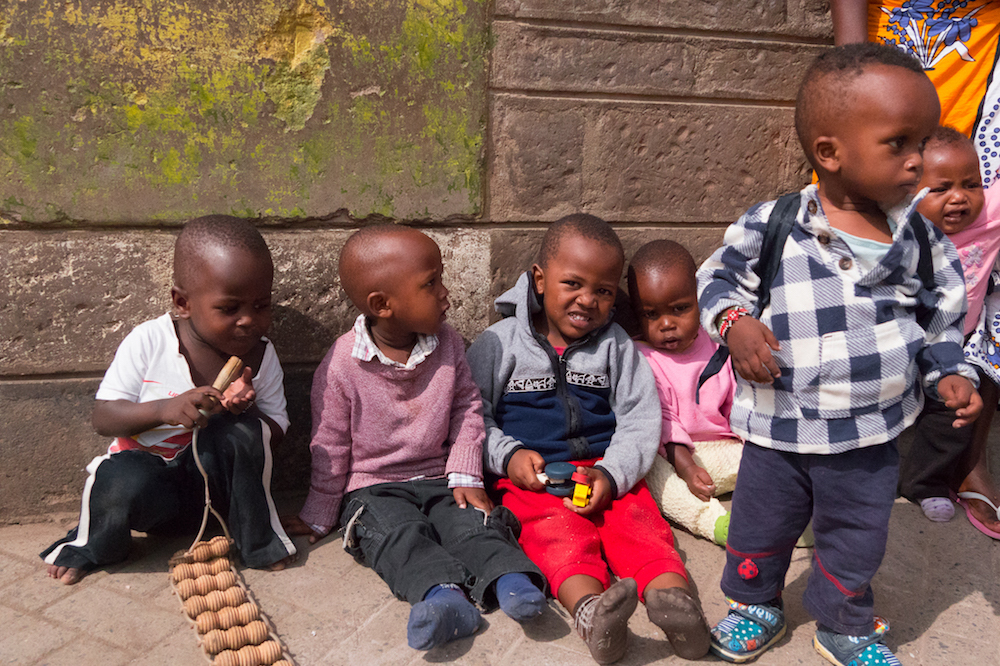
“There are at least 2700 informal child daycares in Nairobi – Tiny Totos is working to help them upgrade their services”
Childcare
Emma Caddy of Tiny Totos Kenya explains how support for informal daycare centres in Kenya's capital city can help them to provide affordable, stimulating and safe services for working parents.
About 2.5 million people in Nairobi, Kenya’s capital city, live in and around informal settlements – marginalised neighbourhoods that occupy just 6% of land in the city.
In these crammed, deprived areas an estimated 300,000 children are four years old and below.
There are no formal state institutions providing preschool care and slum-based families are dominated by rural migrants whose relatives mainly live in faraway villages.
So working parents and particularly single mothers have no choice but to arrange for someone to look after their children while they are out during the day (or night).
They can leave their children at home unattended, pull their older girls out of school to look after the younger siblings or leave them in ad hoc, temporary arrangements with neighbours.
A parent’s primary option is to leave their babies and toddlers in unregistered, unregulated, informal daycares run by untrained women with little – if any – formal education in childcare or business management.
A recent mapping exercise suggested that the number of informal daycares operational in Nairobi is at least 2700. The problem in defining the market is the invisibility of the sector, given their largely unregistered status.
Given the low standard set, it is not surprising that these informal daycare facilities are often substandard, run in cramped, airless homes or centre-based rooms, with an unmanageable adult-to-child ratio.
There are little, if any, age-appropriate activities at play, no development or health monitoring – not even a basic register containing the child’s key contacts or basic health details.
The owner-managers, with little or no formal training or investment, generally run their ventures on a day-by-day basis, with little understanding or regularity of structure, systems or pricing.
And yet, even with these types of service, a market exists – with thousands of such businesses in operation and many more thousands of working mothers dependent on them to be able to go out to work and earn money to support their families.
With state primary school services under-resourced, there are no realistic prospects of any significant state investment in the sector.
Given the congested nature of slums and the poverty of clients, significant interest from private sector players is needed.
In this context, the most practical approach seems to be: work to elevate conditions and services of existing sector providers, rather than replace them. Which is exactly what Tiny Totos is working to do.
Tiny Totos is a registered Kenyan company and social enterprise which has built a cost-effective intervention programme, providing capital and skills training to informal entrepreneurs running daycares in the slums of Nairobi.
This will help them to upgrade their services and provide affordable, stimulating and safe care to children four and under.
Over the past two years Tiny Totos has built a holistic approach to transforming the services of informal daycares. We combine training in leadership, business, early childhood education, development and nutrition, and data collection with investment in facilities and service improvement to introduce standards and association among disparate, informal daycare providers.
Through group and individual training and, most importantly, membership of a valued peer network, Tiny Totos’ daycare have enjoyed on average a four-fold increase in revenue – some increases as great as ten times – while recording significant improvements in the children’s health and development data.

Tiny Totos has proven that slum-based daycare entrepreneurs are no different from any other business owner.
They want to see their businesses grow, they want to earn more money and they want to enjoy job satisfaction and pride from their work.
Given half a chance they will seize the opportunity to get ahead. All they need is the right kind of intervention approach, designed to uplift their ventures – not distort the market, make them dependent or undermine their clients’ willingness to pay.
Going forward, Tiny Totos is looking to extend the wellbeing of children from daycares to their homes, while building the foundations of its own financial sustainability and ability to function at scale.
As Tiny Totos’ partner daycares grow in number, each client’s contact details are registered in the organisation’s database and each payment is recorded via an app connected to a unique user ID to build a picture of client frequency at the daycare.
Tiny Totos, through its work, is betting on the ability of women - however uneducated - to make an even greater contribution to the care of underprivileged preschool children Emma Caddy, Tiny Totos Kenya
Tiny Totos is also building a distribution network of parent clients who can be incentivised to buy additional health and wellbeing products and services used in the daycares on a financed basis to use at home.
Products include hardware such as clean cookstoves, water filters and solar lamps to fast-moving consumer goods such as pampers and feminine products.
Informal daycares are the most frequented childcare institutions in the city. With mothers learning from other mothers and daycare managers how best to care for their children, the scope for positive behavioural change for all involved through a trusted, frequent peer network is extremely significant.
Tiny Totos, through its work, is betting on the ability of women – however uneducated – to make an even greater contribution to the care of underprivileged preschool children.
At the same time, they will be unlocking the economic potential of their working mother clients to make an even greater contribution to society than they already are. We look forward to more partners in this journey.
More news

